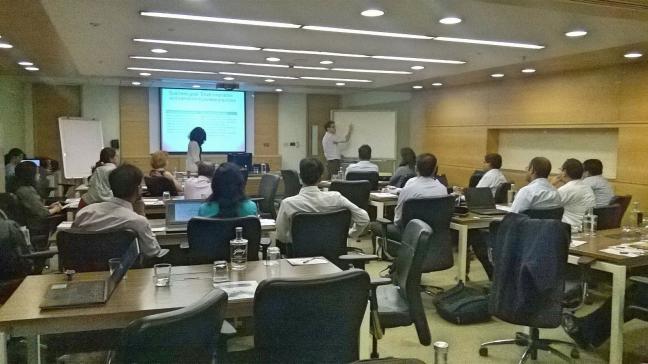Leading Businesses Look to Drive Climate Action Based on Science

Indian private sector hopes to usher in a new era of corporate climate action
Mumbai, INDIA (5 November, 2015) – Leading businesses in India participated in the first public consultation on the draft of the Science-based Target Setting Manual, a guidance on setting corporate emissions reduction targets that align with climate science. Science Based Targets (SBT) is a joint initiative by World Resources Institute (WRI), Carbon Disclosure Project (CDP), the UN Global Compact (UNGC), and World Wildlife Fund (WWF) intended to increase corporate ambition on climate action.
Globally, over 60 leading companies from a range of sectors and geographies have so far committed to setting science-based targets. A few notable businesses are Coca Cola Enterprises, who aim to cut their emissions from operations by 50 percent from 2007 levels by 2020; Procter & Gamble, pledging a reduction of emissions from operations by 30 percent from 2010 levels by 2020; and General Mills, targeting a 28 percent decrease from 2010 levels by 2025.
Targets are considered science-based if they are in line with the level of emissions reductions necessary to keep the global temperature increase below 2 degree C compared to pre-industrial temperatures, as described in the Fifth Assessment Report of the Intergovernmental Panel on Climate Change (IPCC). A growing number of companies are aiming to reverse the global trend by reducing their own GHG emissions. However, there is a lack of consistent methods for companies to align their emissions targets with global climate science scenarios.
“Setting science-based targets is not just about combating climate change— companies benefit significantly from innovation in products, technologies, and supply chains, thus safeguarding their future profitability in a carbon-constrained world. They also gain a competitive advantage as India looks to adopt a low-carbon economy trajectory,” explained Vivek Adhia, Head – Business Engagement at WRI India.
Mr. L Rajasekar, Executive President, UltraTech Cement, largest manufacturer of grey cement, Ready Mix Concrete (RMC) and white cement in India says “With SBT, we now have a defined methodology and process to define our own business targets that was missing earlier. This will help to build doing term carbon strategy keeping in mind your carbon intensity and makes you prepare for the future.”
Mr. Himanshu Nautiyal, Head – Business Excellence, WCM & Sustainability (Chemicals Fertilisers & Insulators Busines)s – Aditya Birla Group, also added, “ As one of the leading Chemicals, Fertilizers and Insulators Business under Aditya Birla Group, we would like to expand our global business footprint and demonstrate sustainable growth. Accordingly we have embarked on a journey to look at a scientific approach for emission reduction in line with the 2 degree Celsius goal and are working with WRI under the India GHG Program on the process.”
The SBT manual provides guidance on setting corporate emissions reduction targets that align with climate science and support the global effort to limit warming to a manageable 2 gearing up for a global degree C. Over 30 participants from leading businesses in India – Aditya Birla Group, JSW Steel, HCC, Mahindra and Mahindra and Tata Teleservices, Jain Irrigation and Dalmia Cement explored the various steps of scientifically setting a GHG emissions reduction target at the workshop in Mumbai.
“The constant improvement in the ranking of Indian companies in disclosing vital climate change information to the world offers good momentum, especially coming at a time when countries are gearing up for a global agreement at the upcoming Paris climate meetings. Responsible low-carbon action from Indian companies will help investors and policymakers to make informed decisions,” said Damandeep Singh, Director, CDP India.
ENDS
Notes for editors:
Sustainability managers, executives, and others with interest in this topic can submit feedback to the draft manual via our feedback submission survey here. We will accept responses until November 16, 2015. The Science Based Targets Manual can be accessed here Science-based Target Setting Manual.
About
WRI India WRI India is a research organisation with experts and staff who work closely with leaders to turn big ideas into action to sustain a healthy environment—the foundation of economic opportunity and human well-being. We envision an equitable and prosperous planet driven by the wise management of natural resources. We aspire to create a world where the actions of government, business, and communities combine to eliminate poverty and sustain the natural environment for all people. www.wri-india.org
About the Science Based Targets initiative
Science Based Targets aims to encourage businesses to take swift climate action by setting new, ambitious greenhouse gas (GHG) emission reduction targets.
It was formed as a response to the urgent call of the Intergovernmental Panel on Climate Change (IPCC) to decarbonize the economy, and is a joint collaboration between CDP (formerly the Carbon Disclosure Project), the United Nations Global Compact, World Resources Institute and WWF. This forms part of the work of the We Mean Business coalition. Please follow us at @sciencetargets or visit us at www.sciencebasedtargets.org to find out more.
For Immediate Release Contact: Divya Kottadiel; Manager - Communications, World Resources Institute (dkottdiel@wri.org)

